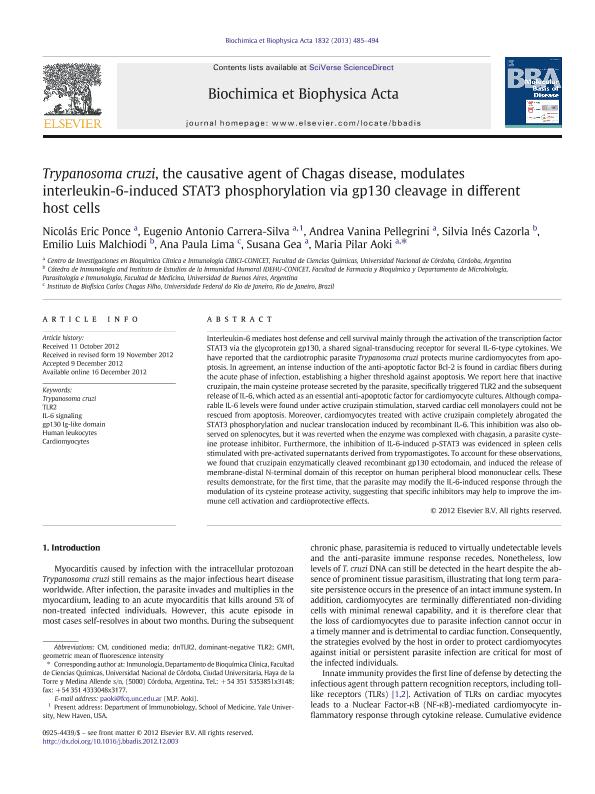Mostrar el registro sencillo del ítem
dc.contributor.author
Ponce, Nicolás Eric

dc.contributor.author
Carrera Silva, Eugenio Antonio

dc.contributor.author
Pellegrini, Andrea Vanina

dc.contributor.author
Cazorla, Silvia Ines

dc.contributor.author
Malchiodi, Emilio Luis

dc.contributor.author
Lima, Ana Paula
dc.contributor.author
Gea, Susana

dc.contributor.author
Aoki, Maria del Pilar

dc.date.available
2016-11-08T19:16:14Z
dc.date.issued
2013-03
dc.identifier.citation
Ponce, Nicolás Eric; Carrera Silva, Eugenio Antonio; Pellegrini, Andrea Vanina; Cazorla, Silvia Ines; Malchiodi, Emilio Luis; et al.; Trypanosoma cruzi, the causative agent of Chagas disease, modulates interleukine-6-induced STAT3 phosphorylation via gp130 cleavage in different host cells; Elsevier Science; Biochimica Et Biophysica Acta - Molecular Basis Of Disease; 1832; 3; 3-2013; 485-494
dc.identifier.issn
0925-4439
dc.identifier.uri
http://hdl.handle.net/11336/8065
dc.description.abstract
Trypanosoma cruzi, the causative agent of Chagas disease, modulates interleukine-6-induced STAT3 phosphorylation via gp130 cleavage in different host cells. Ponce NE, Carrera-Silva EA, Pellegrini AV, Cazorla SI, Malchiodi EL, Lima AP, Gea S, Aoki MP. Biochim Biophys Acta - Mol Basis Dis, in press. IF = 5.39. Abstract Interleukin-6 mediates host defense and cell survival mainly through the activation of the transcription factor STAT3 via the glycoprotein gp130, a shared signal-transducing receptor for several IL-6-type cytokines. We have reported that the cardiotrophic parasite Trypanosoma cruzi protects murine cardiomyocytes from apoptosis. In agreement, an intense induction of the anti-apoptotic factor Bcl-2 is found in cardiac fibers during the acute phase of infection, establishing a higher threshold against apoptosis. We report here that inactive cruzipain, the main cysteine protease secreted by the parasite, specifically triggered TLR2 and the subsequent release of IL-6, which acted as an essential anti-apoptotic factor for cardiomyocyte cultures. Although comparable IL-6 levels were found under active cruzipain stimulation, starved cardiac cell monolayers could not be rescued from apoptosis. Moreover, cardiomyocytes treated with active cruzipain completely abrogated the STAT3 phosphorylation and nuclear translocation induced by recombinant IL-6. This inhibition was also observed on splenocytes, but it was reverted when the enzyme was complexed with chagasin, a parasite cysteine protease inhibitor. Furthermore, the inhibition of IL-6-induced p-STAT3 was evidenced in spleen cells stimulated with pre-activated supernatants derived from trypomastigotes. To account for these observations, we found that cruzipain enzymatically cleaved recombinant gp130 ectodomain, and induced the release of membrane-distal N-terminal domain of this receptor on human peripheral blood mononuclear cells. These results demonstrate, for the first time, that the parasite may modify the IL-6-induced response through the modulation of its cysteine protease activity, suggesting that specific inhibitors may help to improve the immune cell activation and cardioprotective effects.
dc.format
application/pdf
dc.language.iso
eng
dc.publisher
Elsevier Science

dc.rights
info:eu-repo/semantics/openAccess
dc.rights.uri
https://creativecommons.org/licenses/by-nc-nd/2.5/ar/
dc.subject
Trypanosoma Cruzi
dc.subject
Chagas Disease
dc.subject
Il6
dc.subject
Gp130
dc.subject.classification
Inmunología

dc.subject.classification
Medicina Básica

dc.subject.classification
CIENCIAS MÉDICAS Y DE LA SALUD

dc.title
Trypanosoma cruzi, the causative agent of Chagas disease, modulates interleukine-6-induced STAT3 phosphorylation via gp130 cleavage in different host cells
dc.type
info:eu-repo/semantics/article
dc.type
info:ar-repo/semantics/artículo
dc.type
info:eu-repo/semantics/publishedVersion
dc.date.updated
2016-11-07T15:39:31Z
dc.journal.volume
1832
dc.journal.number
3
dc.journal.pagination
485-494
dc.journal.pais
Países Bajos

dc.journal.ciudad
Amsterdam
dc.description.fil
Fil: Ponce, Nicolás Eric. Consejo Nacional de Investigaciones Científicas y Técnicas. Centro Científico Tecnológico Córdoba. Centro de Investigaciones En Bioquímica Clínica E Inmunología; Argentina
dc.description.fil
Fil: Carrera Silva, Eugenio Antonio. Consejo Nacional de Investigaciones Científicas y Técnicas. Centro Científico Tecnológico Córdoba. Centro de Investigaciones En Bioquímica Clínica E Inmunología; Argentina
dc.description.fil
Fil: Pellegrini, Andrea Vanina. Consejo Nacional de Investigaciones Científicas y Técnicas. Centro Científico Tecnológico Córdoba. Centro de Investigaciones En Bioquímica Clínica E Inmunología; Argentina
dc.description.fil
Fil: Cazorla, Silvia Ines. Consejo Nacional de Investigaciones Cientiâficas y Tecnicas. Oficina de Coordinacion Administrativa Houssay. Instituto de Estudios de la Inmunidad Humoral "profesor R. A. Margni"; Argentina
dc.description.fil
Fil: Malchiodi, Emilio Luis. Consejo Nacional de Investigaciones Cientiâficas y Tecnicas. Oficina de Coordinacion Administrativa Houssay. Instituto de Estudios de la Inmunidad Humoral "profesor R. A. Margni"; Argentina
dc.description.fil
Fil: Lima, Ana Paula. Universidade Federal do Rio de Janeiro; Brasil
dc.description.fil
Fil: Gea, Susana. Consejo Nacional de Investigaciones Científicas y Técnicas. Centro Científico Tecnológico Córdoba. Centro de Investigaciones En Bioquímica Clínica E Inmunología; Argentina
dc.description.fil
Fil: Aoki, Maria del Pilar. Consejo Nacional de Investigaciones Científicas y Técnicas. Centro Científico Tecnológico Córdoba. Centro de Investigaciones En Bioquímica Clínica E Inmunología; Argentina
dc.journal.title
Biochimica Et Biophysica Acta - Molecular Basis Of Disease

dc.relation.alternativeid
info:eu-repo/semantics/altIdentifier/url/http://www.sciencedirect.com/science/article/pii/S0925443912002888
dc.relation.alternativeid
info:eu-repo/semantics/altIdentifier/doi/http://dx.doi.org/10.1016/j.bbadis.2012.12.003
Archivos asociados
